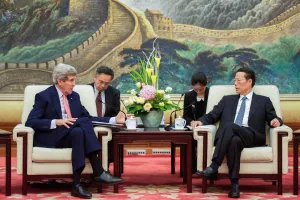On December 13, 2020, one of then-Governor of New York Andrew Cuomo’s former staff members accused him of habitual sexual harassment. Within days, news outlets were reporting the back-and-forth between the accuser and Cuomo’s office. Close to a year later, on November 2, 2021, Chinese star tennis player Peng Shuai leveled even more severe allegations of rape at a former Communist Party official, Zhang Gaoli. Within moments, her accusation was ripped from the internet, and within days people were noticing she’d disappeared from the public eye.
The disparity in those experiences ought to be clear enough, but I just want to take a quick look at the details of each of these cases.
Zhang Gaoli, the subject of Peng Shuai’s accusation, is a career apparatchik and member of the Chinese Communist Party (CCP). His first formal appointment by the party was in 1984, and by 2012 he found himself among the seven members of the Politburo Standing Committee, China’s ruling council. Peng posted her accusation of the now-retired party official to her Weibo, a Chinese social media platform.
Within minutes, her post was deleted. Searches for her, for “tennis,” or Zhang, among other keywords, stopped returning results other than from media approved by the CCP. Other users posting about it or sharing screenshots of her statement were quickly censored as well.
When many outside China, who could not be so easily silenced by the CCP, began to demand to hear from Peng to ensure she was safe and able to tell her story to the world, her account remained silent. Instead, media outlets and sporting organizations received emails supposedly written by Peng, asking for privacy. Chinese state media outlets began releasing pictures and videos “confirming” Peng was fine and happy. They were quickly debunked or rendered meaningless without any testimony from the player about recent events. Eventually, the International Olympic Committee—which is organizing winter games for February in Beijing—was able to hold a private video meeting with Peng. All was well, they gullibly reported.
While there is no politburo or one-party rule in America, Andrew Cuomo has had an impressive career, too. His father, Mario, was a governor of New York, and Andrew was in his third term in the position when the accusations came.
While skepticism from some dogged the original accuser’s claim against Cuomo, she was never silenced either by the government or by private social media firms. Over several months, more accusations appeared, and an investigation was launched by the state Attorney General. By August, the report was released, and it included detailed testimony from eleven different individuals alleging inappropriate behavior and sexual harrassment.
With the release of the report, high-ranking members of Cuomo’s own political party, including President Joe Biden, urged him to resign. Shortly thereafter, looking at a likely impeachment, Cuomo heeded the advice. Earlier this week, the first accuser Lindsey Boylan tweeted, “Incredible how many powerful people and organizations tried to destroy me...They did not succeed. They never will.”
In the US, the impact of the #MeToo movement is obvious, even if sexual harassment and abuse continues to persist. After all, Boylan is right that no person could silence her, and in the end, the cascade she started brought down a titanic figure in American politics. What’s more, it seems Cuomo’s brother may go down with him.
In China, on the other hand, it’s equally obvious just how unassailable high-ranking party members are. No matter celebrity, national service, or wealth, nobody is allowed to criticize party leadership, even retired figures like Zhang. In fact, the louder your voice is, the harsher punishment it seems the party is willing to hand you for using it.
It surely isn’t novel to point to China as a totalitarian system and America as a democratic one in which free expression flourishes. But this comparison does offer some important reminders. However flawed our democracy or the #MeToo movement, it’s encouraging to see that bottom-up agitation can yield results, even outside elections, as it did with Cuomo. After all, democracy is far more than regular elections. China may claim, as it often does, that it embodies “democracy in essence,” rather than form, but successful activism and protest are far more the essence of democracy than China’s silencing of dissent.
Subscribe to Spectacles

Comments
Join the conversation